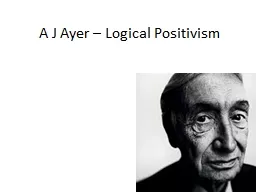PPT-Freud, Nietzsche and the Challenge to Positivism
Author : marina-yarberry | Published Date : 2017-08-24
Making of the Modern World Week 13 Structure of Lecture Positivism Nietzsche Freud Concluding thoughts and impact POSITIVISM A philosophical theory stating that
Presentation Embed Code
Download Presentation
Download Presentation The PPT/PDF document "Freud, Nietzsche and the Challenge to Po..." is the property of its rightful owner. Permission is granted to download and print the materials on this website for personal, non-commercial use only, and to display it on your personal computer provided you do not modify the materials and that you retain all copyright notices contained in the materials. By downloading content from our website, you accept the terms of this agreement.
Freud, Nietzsche and the Challenge to Positivism: Transcript
Download Rules Of Document
"Freud, Nietzsche and the Challenge to Positivism"The content belongs to its owner. You may download and print it for personal use, without modification, and keep all copyright notices. By downloading, you agree to these terms.
Related Documents














